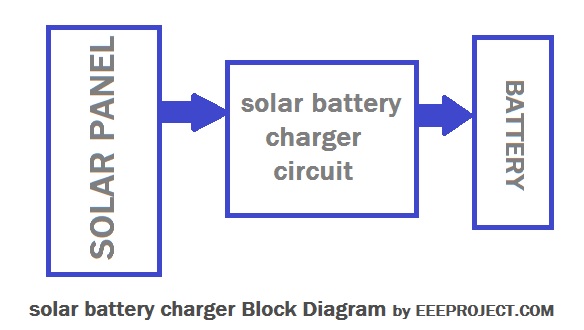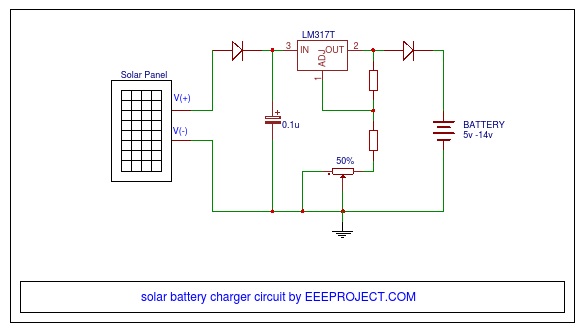Solar Battery Charger
Solar Battery Charger is very much preferred by everyone no matter what kind of place you live in since just by using a Solar Battery Charger Circuit you can collect the electrical energy and reuse it again in applications such as charging your mobile phone, tablets, etc.
Solar energy is one of the best renewable energy or free energy which you can harvest anywhere at any time (except it must be the daytime 🙂 )
The concept of solar panels was introduced by Alexandre Edmond Becquerel in 1839. Today everyone knows what solar panel does and how it has been useful to date. In the modern days, the method to generate electricity which is also known as nonrenewable energy has caused great harm including the depletion of the ozone layer which had prevented us from the harmful UV rays from the sun.
A huge setup of Solar Battery Chargers had been proven to be a great revolution in today’s energy crisis but it’s not just limited to that, now you can have the Solar Battery Charger in your pocket and can use it when you need an emergency.
Today we are here to discuss the way that how you can make such a Solar Battery Charger Circuit and a setup that you can carry in your pocket. If you’re here looking to buy a Solar Battery Charger instead of making it by yourself you can still choose one from the list. 🙂
Making the Solar Battery Charger Circuit by yourself
If you still want to make the Solar Battery Charger circuit then below is the block diagram that shows what are you going to accomplish.

From the Above block diagram, you can very easily get an idea that how your circuit is going to work. Solar Battery Charger will take the dc input from the solar panel and will regulate the voltage in order to charge the battery from it.
The solar battery charger circuit which we are making is made up of electronic components which are easily available on market as well as online.
Below are the components which you will need to complete the solar battery charger circuit.
- Solar panel
- Voltage regulator
- Resistors of variable resistance
- Diode
- Schottky diode
- Battery (5v – 14V)
- LED lights
Additionally, you can use the 5 V boost converter along with the battery we charge in order to charge our devices like a mobile phone from the circuit or the charged battery.

Working on solar battery charger circuit
The solar panel which is being used as the output voltage and current near about 17 V and 0.3 A respectively. We use the LM317T voltage regulator IC instead of the traditional 78XX voltage regulator family since the output voltage of the LM317T IC can be easily set to the desired voltage from 1.25 V to 37 V with the maximum current of 1.5 A.
However,
The LM317T Voltage Regulator IC does have a significant voltage drop of 2V to 2.5V.
Therefore, we manage to supply the input and set the output voltage in order to obtain the output which would be greater than the rating of the lead acid battery which we are using (i.e. 12v and 1.3Ah).
You can refer to the LM317 Datasheet if you need to know how the regulated voltage is controlled.
The Schottky diode plays a very vital role in the Solar Battery Charger as there would be a negative current flow to the solar panel when the battery is not being charged. The Schottky diode of current rating up to 3A can do pretty well.
Charging 12V Battery Solar Battery Charger
In order to charge the 12V battery, you must set the voltage of the LM317 IC up to 14.5 V. Most of the batteries do specify the minimum voltage to charge, you need to configure the voltage of the regulator IC up to that voltage.
The battery we use needs a charging current of 0.2 A which is less than the output of the solar panel (i.e. 0.29 A ). The voltage regulator LM317 IC can provide the maximum output of 1.5 V. In the case if the battery needs more current than 1.5 A then it’s not a good option to use LM317 IC.
The battery we use is of capacity 1.3 AH. We need to solve 1.3 AH / 0.29 A in order to calculate the time to get fully charged where 0.29 A is the charging current of our circuit. The battery will take approximately 4.5 hours to get fully charged.
Applications of a Solar Battery Charger
- The Solar Battery Charger can be used to charge our electronics while traveling.
- While camping the backup battery charged by the solar charger can be used for lightning purposes.
- It can be used as a backup power supply which you can keep in your backpack or in your pocket.
Advantages of Solar Battery Charger
There is end number of advantages of using these rechargeable battery circuits. The benefits of this circuit are mentioned below:
- This not only protects our environment but does not even create a hole in our pockets.
- So, these circuits are affordable and easy to use.
- One can easily adjust the output voltage of these circuits as per the requirement of their appliance.
- For setting up this circuit no hi-tech appliances are used. Simple and easy components are required for setting up the circuit for the solar battery charger.
- The battery discharge is almost equal to zero when there is no consumption, so the energy remains conserved.
Disadvantages of Solar Battery Charger
Some of the limitations of the solar battery charger circuit are as follows:
- In some of the circuits, the current is limited up to a certain limit.
- And in some of the circuits, high voltage is a must for its proper functioning.
Do share your thoughts or any suggestion in below comment box.

12 thoughts on “Solar Battery Charger Circuit with Voltage Regulator”
This post is really informative, This circuit is really cheap and affordable.
My this semester project 😀
Could you suggest similar solar charger circuit ? i was looking to make a one for my power bank
If i need to get the 4A or charging current from the above circuit what necessary changes should i have to make ?
Nice article ! But can you explain how do it prevent from the over charging ?
I brought 3 solar panel from the market and connected them in parallel, the output is 11.7V. How can i change this voltage to 15V in order to charge my 12V battery ?
USE one XL6009 module
What are the resistors value? If the output is 9v? Then this output is the input to another circuit as 5v ( I used voltage regulator to convert)
HAI, I HAVE 8.5 SOLAR PANEL IS THERE. BUT I WANT CHARGE 12V BATTERY.
IF CHANGE RESISTANCE AND ETC.,
PLS SEND ANSWER, THANKYOU FOR YOU THIS OPPORTUNITY
Hi Suresh
You can’t get an output more than its rating. Instead, if you want 12V then have a solar panel with more than 12V output rating.
Thanks
EEE PROJECTS Team
how the calculation work ? for setting the resistor.
Hi Sr plx can I have the writi up of this project